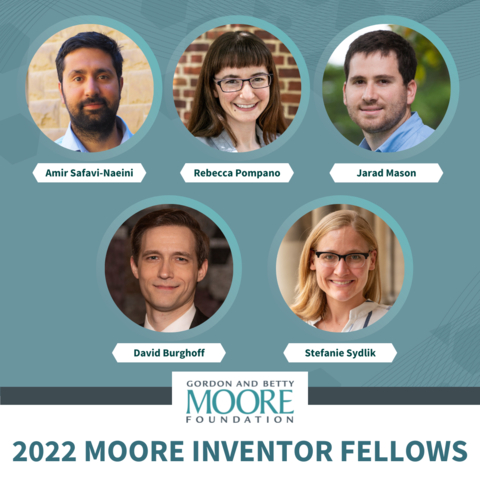Fellowship established to honor one of Silicon Valley’s founders recognizes early-career, scientist-inventors across the country.
Today, the Gordon and Betty Moore Foundation announced the 2022 cohort of Moore Inventor Fellows. The fellowship supports scientist-inventors who create new tools and technologies with a high potential to accelerate progress in the foundation’s areas of interest: scientific discovery, environmental conservation and patient care.
This press release features multimedia. View the full release here: https://www.businesswire.com/news/home/20221004005401/en/

2022 Moore Inventor Fellows (Graphic: Business Wire)
“The Moore Inventor Fellowship recognizes the power of innovation to solve problems and reimagine our world,” said Harvey V. Fineberg, M.D., Ph.D., president of the Gordon and Betty Moore Foundation. “We are pleased to recognize the spectrum of disciplines, ideas and approaches embodied in this group of fellows.”
While their backgrounds and fields of expert knowledge vary, the five fellows share a common curiosity about our world and a passion for transformative ideas. This year’s inventors are working toward creating an environmentally friendly way to stay cool using solid refrigerants, a promising therapy for low-level lead poisoning, real time sensing of chemical concentrations using microcombs, a biochemical system to map protein secretions in live tissue biopsies, and a chip-scale sensor to detect the proteins in a single cell.
“We are thrilled to support another stellar cohort of Moore Inventor Fellows from institutions across the United States,” said Adam Jones, Ph.D., Science Program Officer. “These awards will enable each fellow to take risks and advance their inventions to the next level.”
This year, the foundation received nearly 200 nominations, from which five fellows were selected. Each fellow receives a total of $825,000 over three years to drive their invention forward, which includes $50,000 per year from their home institution as a commitment to these outstanding individuals.
Launched in 2016 to celebrate the 50th anniversary of Moore’s Law, the revolutionary prediction that anticipated the exponential growth of computing power, the fellowship embraces the spirit of Gordon Moore’s passion for science and penchant for inventing. The foundation plans to allocate a total of nearly $34 million through 2026 to support fifty Moore Inventor Fellows – five fellows per year for ten years, beginning in 2016, and expects the fellows will enable breakthroughs that accelerate progress over the next fifty years.
Nominations for 2023 Moore Inventor Fellows are being solicited from eligible institutions until November 14, 2022. To gain access to the application system, please send the name and contact information for your institution’s point of contact to inventors@moore.org by October 4, 2022.
More information is available at http://www.moore.org/inventors.
2022 Moore Inventor Fellows
David Burghoff, Ph.D., Assistant Professor, Electrical Engineering, University of Notre Dame (@Burghoff)
Dr. Burghoff’s invention aims to produce the first compact and broadband light sources in the longwave infrared, which have the potential to allow sensing of chemical concentrations and physical dynamics in real time. The applications could range from medical breathalyzers to greenhouse gas detection.
Jarad Mason, Ph.D., Assistant Professor, Chemistry & Chemical Biology, Harvard University (@HarvardCCB)
Dr. Mason’s invention is a solid-state refrigerant that will provide sustainable cooling for an ever-warming world.
Rebecca Pompano, Ph.D., Associate Professor, Chemistry, University of Virginia (@PompanoLab)
Dr. Pompano’s invention is a biochemical system to map out protein secretion in live tissue biopsies, thus revealing mechanisms of inflammatory disease and informing drug design for cancer and autoimmunity.
Amir Safavi-Naeini, Ph.D., Associate Professor, Applied Physics, Stanford University (@Amir_Safavi_N)
Dr. Safavi-Naeini's invention focuses on developing nanoscale mechanical oscillators that can be easily arrayed on a chip's surface to detect proteins with unprecedented sensitivity and speed by accurately measuring their masses.
Stefanie Sydlik, Ph.D., Associate Professor, Chemistry, Carnegie Mellon University (@StefSydlik)
Dr. Sydlik’s invention is a Biobinder for lead chelation. This is a biopolymer that can rapidly remove heavy metals from the body and is a promising therapy for low-level lead poisoning, for which there is currently no treatment.
View source version on businesswire.com: https://www.businesswire.com/news/home/20221004005401/en/
Contacts
Trity Pourbahrami, Communications Officer, Gordon and Betty Moore Foundation: trityp@moore.org, (626) 298-5533













